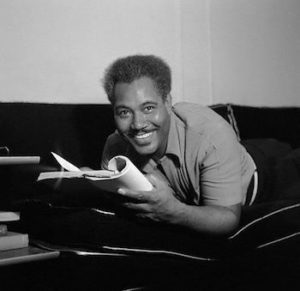
Rex Ingram
Rex Ingram, a Black actor, was born on this date in 1895.
He was born on a houseboat on the Mississippi River near Cairo, IL, when his mother, who was on her way home from a visit with relatives in Natchez, MS, went into labor.
The son of a riverboat fireman, Ingram is said to have grown up working with his father on the steamer Robert E. Lee. He became interested in acting while attending military school. In 1912, he enrolled at Northwestern University in Evanston, IL, where he became the first Black man to earn a Phi Beta Kappa key. Ingram said that he headed for California in 1919, where he sailed for 18 months as a crewman on a sailboat.
In his first film, "Tarzan of the Apes," 1918, Ingram was cast in a bit part. He appeared in many other Tarzan films and the silent films "The Ten Commandments," "The Big Parade," "Salome," and "King of Kings." While in Hollywood, Ingram worked several jobs between films to support himself. According to Ebony Magazine, he claimed to have been called "the greatest Negro heavyweight prospect since Jack Johnson" when he fought professionally in California in 1921.
Ingram moved to New York City in 1928. In 1929, he made his stage debut on Broadway in "Lulu Belle" and played in "Porgy and Bess" on Broadway. In 1933, Ingram played a small part in the film "Emperor Jones." Other off-Broadway shoes in which he performed small parts were "Goin' Home" (1932), "Stevedore" (1933), "Marching Song" (1934), and "Once in a Lifetime" (1935). More successful on screen than on stage, Ingram's first big break came in 1936 when he was cast as De Lawd in the film version of "The Green Pastures," Ingram married Francine Everett the same year.
Ingram was denied many roles during his career because he was Black, yet he was one of the few actors to serve on the board of directors of the Studio Actor’s Guild. Ingram became an international star when, in 1940, he was chosen to play the Genie of the Lamp role in the British film "The Thief of Baghdad." One of his best-known roles was in the film "Cabin in the Sky" (1943). As Ingram's fame soared, he promised not to accept any more demeaning roles for Blacks. He recognized the powerful influence of the entertainment media and wanted to help rather than retard the process of Black freedom and acceptance in America.
He returned to Hollywood performing in "Talk of the Town" (1942), "Cabin in the Sky" (1943), "Sahara" (1943), "Fired Wife"(1943), "A Thousand and One Nights" (1948), and "Moonrise" (1948). In 1948, Ingram's bright career stopped when he was arrested for transporting a minor, a 15-year-old white girl from Salina, Kansas, across state lines for immoral purposes. He pled guilty to the charges and was sentenced to an 18-month jail term. He served ten months before being released on parole. Ingram lost his home in Warm Springs Canyon, California, and suffered greatly from depression and self-doubt. In 1951, Ingram appeared after the tragedy in Nick Stewart's "Christopher Columbus Brown." Ingram never achieved the stardom he lost again.
However, he did manage to find work, playing an African chief in "Ramar of the Jungle" (1952), "Anna Lucasta" (1958), "God's Little Acre" (1958), "Elmer Gantry" (1960), "Your Cheating Heart" (1964), and "Hurry Sundown" (1967). In 1957, he appeared on Broadway in the all-black production of "Waiting for Godot." He appeared in the television shows Daktari, I Spy, Gunsmoke, and Playhouse 90. His last role was in The Bill Cosby Show. Ingram smoked a pipe and made a hobby of collecting them; he owned about 500 pipes.
He had a heart attack and died at his home in Hollywood on September 19, 1969, at 73, leaving behind his second wife, Dena, daughter Gloria Wagner, and two grandsons. He had a long career as an actor and enhanced the black male image on stage and in film.